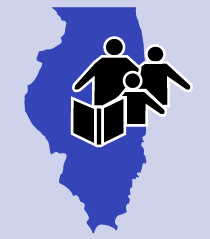
EI Provides Critical Supports for Children with Lead Exposure
By Nicole Hamp and Amy Zimmerman
Lead poisoning is one of the greatest environmental health hazards facing young children. Each year in Illinois, thousands of children are poisoned by lead, often through exposure in their homes. Young children are more vulnerable to the effects of lead poisoning because their brains are still developing. They are also more likely to ingest lead from the environment because of their interactions with their surroundings (e.g., crawling, putting their hands in their mouth, biting/chewing toys).
When a child has low levels of lead, there are usually no outward symptoms. You cannot look at a child and know they have lead poisoning. They likely won’t complain of anything out of the ordinary. That said, children with low levels of lead can still suffer negative health outcomes. Such outcomes may include: problems in school, lower IQ, impaired reading readiness, reading disability, attention deficit/hyperactivity disorder, and behavioral disorders. All of these things can be incredibly difficult for the family of a child with lead poisoning. All of these things can result in increased use of special education resources and increased health care costs.
Supporting Children With Lead Poisoning
Until recently, in Illinois there was little offered to families of children with lead poisoning. Lead in the home (e.g., lead paint, lead dust, lead in water, children’s imported toys, and imported cookware) can be mitigated or removed. In contrast, services to protect children from the negative developmental impacts of lead exposure were unavailable to children who were not exhibiting delays.
This is true even though many of the deficits caused by lower-level lead poisoning are unlikely to be apparent until a child is school-age, when they are expected to do and understand more. By then, it can be too late to intervene meaningfully. Early childhood experiences can greatly impact brain development, positively and negatively.
As a result of effective stakeholder advocacy, Illinois has become a national leader in supporting families of children with lead poisoning. The General Assembly passed legislation that provides automatic early intervention eligibility and services for children with elevated blood lead levels greater or equal to 5 micrograms per deciliter, effective July 2020.
Now, Illinois children with lead exposure are able to access early intervention services with or without signs of delay. Early intervention services and supports will help a child with lead poisoning to learn and hopefully overcome any damage from their exposure during a critical period of brain development.
How Do You Identify Lead Poisoning?
COVID-19 has made it harder to identify children with lead poisoning because many families have been unable or unwilling to bring their child into doctor’s offices for visits. Simultaneously, increased time indoors because of the pandemic may lead to increased lead exposure.
The only way to determine if your child has lead poisoning is to have a blood lead test.
Many children who receive these tests on or near their first and second birthdays have not received them because they haven’t visited the doctor’s office. Because many zip codes in Illinois are high risk for lead exposure, including all Chicago zip codes, it is important to reach out to your primary care provider about having your child tested.
If your child has an elevated blood lead level, you should be notified by your primary care physician as well as the local department of public health or the Illinois Department of Public Health.
The best way for early intervention to process referrals for services is by having your child’s primary care provider fax an early intervention referral form with information that indicates the elevated blood lead level to your local Child and Family Connections office.
Local or state departments of public health are also capable of referring your child and family for early intervention services. For families already in early intervention, it is important to let your case manager and therapists know if you have received a positive lead test. It will help them to think about additional ways to support your child and family.
For more information about lead poisoning, visit Lead Poisoning Prevention.
For more information about the benefits of early intervention for children with lead exposure watch these videos:
- Understanding the Neurocognitive Effects of Low-Level Lead Poisoning, June 2019
- The Benefits of Early Intervention for Children Who Have Been Lead Exposed, April 2019 (Spanish)
Dr. Nicole Hamp, M.D., is a developmental behavioral pediatric fellow at the University of Michigan. She also serves as an Early Childhood Champion to the state of Michigan for the American Academy of Pediatrics.
Amy Zimmerman, J.D., is a member of the Illinois Interagency Council on Early Intervention, a board member at the National Center for Healthy Housing and the assistant vice president for state government affairs at the Jewish United Fund.
Addressing Lead Poisoning Prompts Paradigm Shift in EI
By Pamela Epley
Until recently, strategies to address childhood lead poisoning have focused on prevention and a “wait and see” approach to services. Prevention initiatives include eliminating sources of lead exposure and decreasing the lead level in children’s blood.
The “wait and see” approach refers to special education services provided after a child demonstrates challenges or difficulties in school and receives a diagnosis of development delay or disability. While prevention and special education are important in addressing this environmental health hazard, they are not sufficient.
During the summer of 2019, the state Bureau of Early Intervention partnered with Erikson Institute and Legal Council for Health Justice on a pilot program that made children with elevated blood lead levels automatically eligible for early intervention (EI) services in three areas (Rockford, Cicero-Berwyn, and part of Chicago). The pilot program included
- training service coordinators and EI providers on the common sources and effects of lead poisoning,
- sharing information and resources regarding lead poisoning with families, and
- providing appropriate services when children are demonstrating little to no developmental delay.
We are halfway through the three-year pilot program. We continue to assess children’s development annually after they have turned 3. We’ve already learned from the experiences of children and families as well as their EI providers and service coordinators. We hope to learn more about longer-term benefits of EI services for children with lead poisoning.
Perhaps the most important thing we’ve learned is that serving children with lead poisoning requires a paradigm shift in how we think about EI. Before the General Assembly passed legislation providing automatic eligibility to receive EI services for all children with lead poisoning, services had been limited to children with a 30% or greater developmental delay or established medical condition that put them at substantive risk for later delay.
For children demonstrating a delay, EI providers focus on supporting those area(s) of development and reducing or eliminating the delay. For children with an established medical condition, EI providers monitor their development and implement direct services when a delay becomes apparent.
This approach is insufficient to support children with lead poisoning. We must do more than respond to children’s developmental challenges after they arise. We must proactively support areas of development we know will likely be impacted by lead poisoning. Such areas include working memory, flexible thinking and problem solving, and self-control.
When EI providers work with families on how these skills can be intentionally supported through daily activities, we take advantage of the explosive brain development during the first three years to eliminate or minimize effects of lead poisoning.
This three-prong approach to lead poisoning—preventing exposure to lead, proactively supporting the skills and abilities often impacted by lead exposure during children’s earliest years, and providing special education supports to school-age children as needed—provides our best chance of helping every child reach their fullest potential..
For more information on best practices for working with children with elevated blood lead levels, visit Best Practices for Working with Young Children with Elevated Blood Lead Levels.
Pamela Epley, Ph.D., is a clinical professor and director of special education at the Erikson Institute.
Family Update from the EI Clearinghouse
March 25, 2021
We hope you and your family are doing well. This is an update from the Early Intervention Clearinghouse about relevant resources for the Early Intervention (EI) Program during COVID-19.
- You have three ways to receive EI services: in-person, live video visits (LVV), and phone consultation. Recently, Illinois has started allowing EI providers to have in-person visits with 20 families, instead of 10 families. For more information on what to consider when deciding how to receive EI services, check out our latest tip sheet: Live Video Visits, Phone Consultations, and In-Person Early Intervention (EI) Services: What’s Right for My Family?
- The EI Training Program compiled a list of relevant resources about LVV. The list includes an overview of LVV, resources for service coordinators, technology checklists, resources for EI direct service providers, and resources for families/caregivers.
- If you need technology (e.g., devices, Internet access) to participate in live video visits, you may consider:
- Technology for LVV
This tip sheet provides resources for accessing technology and Internet access for LVV. - EIC Technology Loan Program
The EI Clearinghouse is loaning technology (i.e., iPads with data plans, iPads with WiFi, and WiFi hotspots) to families/caregivers for free.
- Technology for LVV
There is a workgroup composed of relevant stakeholders (including families and providers) addressing EI needs during COVID-19. For weekly updates about the workgroup, see COVID-19 (Coronavirus) Information and Resources.
We will continue to update you about changes to the EI program. If you have questions, comments, or concerns, please reach out to Meghan Burke (meghanbm@illinois.edu).
State Systemic Improvement Plan (SSIP) Update
We are preparing the report on our activities for the federal Office of Special Education Programs. It will be submitted no later than April 1.
We are sharing information about our efforts to improve family engagement. Information about the impact of professional development and local support on practices is also included.
Leadership teams continue to support providers’ shift in service delivery. These teams also have begun piloting a tool to help us understand how families are being supported. We remain hopeful that the strategies being used are helping families during these challenging times!
Related Resource(s)
- Tip Sheets: Everyday Early Intervention: Outdoor Fun
- Resource Guides: Family Fun

